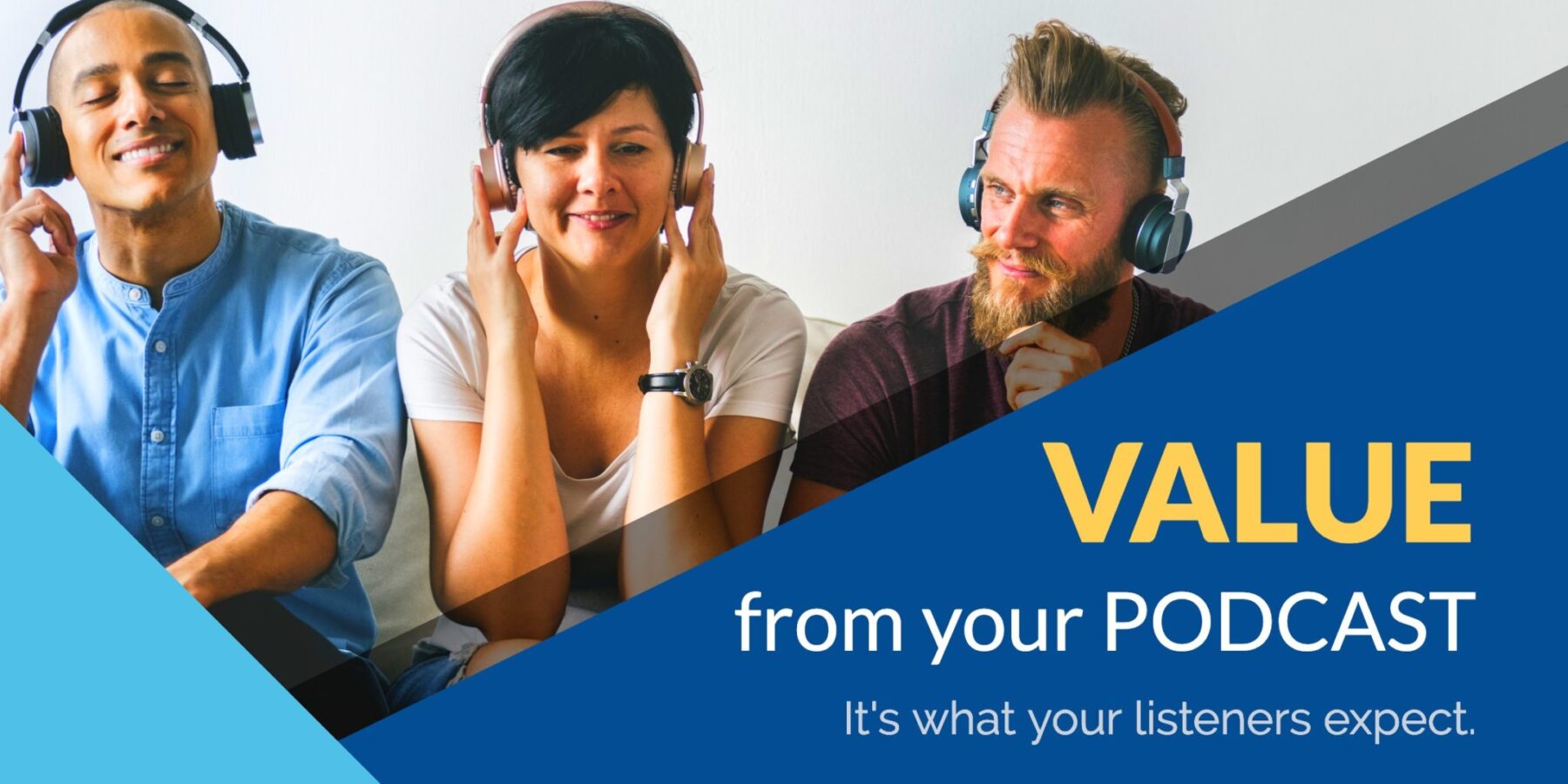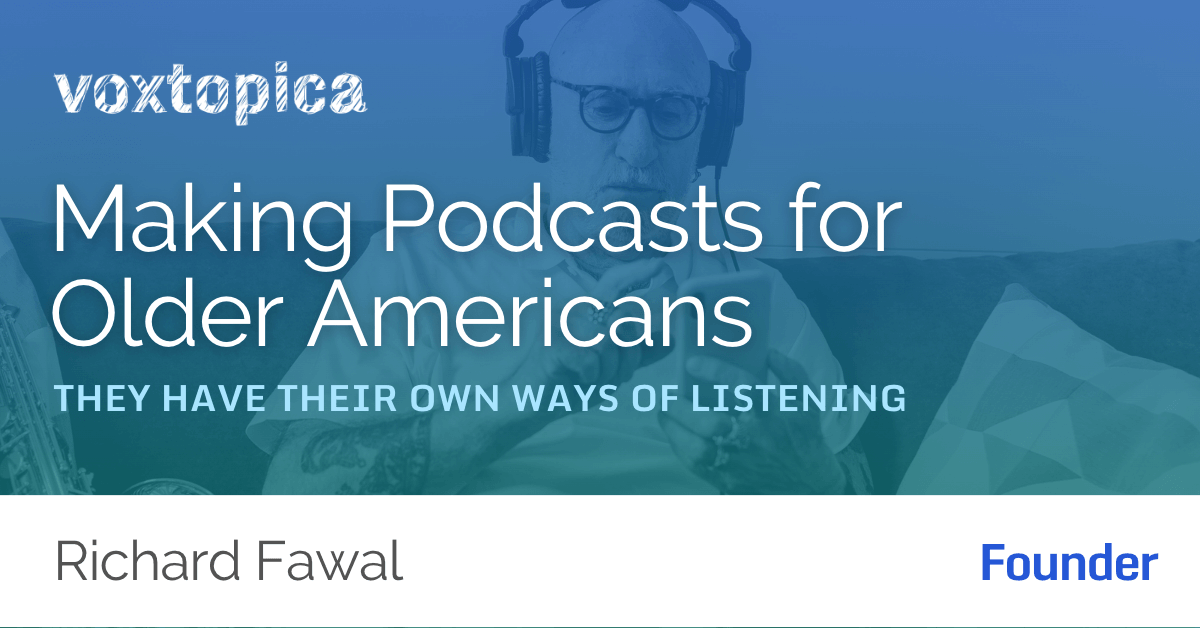In my last post, I wrote about how important it is for association podcasts to define their audience and why you need to create value for that audience. It’s the value you provide that will help your podcast grow.
In this post, I want to focus on that value. There are five things you should think about when creating a podcast for your association or business to ensure you are creating something that audiences will return to episode after episode.
Association podcasts should provide VALUE
Here’s the list in a nutshell: Make your podcast for your listener, not for yourself. Let them know what to expect, and give it to them consistently. Give them something to do in each episode, and give them ways to talk to you — then make sure you talk back. Finally, enjoy making your podcast. Listeners know when your heart’s not in it.
Make podcasts for the Audience
The first thing you need to know about creating value for your audience is that the podcast has to be for them. It doesn’t matter if you’re entertaining, educating, or challenging them. It has to be for them. It can’t be for you.

Enterprises often make the mistake of focusing their podcasts on what they really want listeners to know. That’s an important business goal but it often leads to podcasts that talk at listeners instead of to them. Take the time to consider what the listeners want to know, learn, and understand.
At the risk of sounding repetitive, let me remind you that defining your audience is an important first step. If a business podcast’s audience is potential customers, for example, a podcast that talks about how to use their products will just confuse listeners. They don’t even have the product yet, so the creator risks making the product sound complicated: “Wow, I have to listen to a podcast to be able to use this stuff? Sounds hard.”
Potential customers will likely be much more receptive to a show that talks about a product’s features, perhaps including interviews with current customers who offer testimonials about how easy the products are to use and how they’ve benefitted.
Of course, the opposite is true for a podcast audience of current customers. They’ll appreciate tips and tricks for using your products and information about new features as add-ons.
This all sounds intuitive, I know, but you’d be surprised by how often I hear podcasters go on about the cool guests they have, the great ideas they’re sharing, and the really important information they’re offering up for free, but there doesn’t seem to be anyone listening. A major factor is usually that only they think the guests are cool, the ideas are great, or the information is important.
Fulfill the audience’s expectations
The second thing you need to know about creating value in your podcast is that you have to set expectations for your listeners and then fulfill them in every episode.

The hardest thing about starting a podcast is getting new listeners. The second hardest thing is keeping those listeners, and I’d argue that keeping them is much more important. Why? Think of it this way: If you get 25 new listeners each week but only 10 of them listen to the next episode, it’ll take you 10 weeks to have 100 listeners. If 20 of them come back, however, you’ll have 100 listeners in just five weeks. (This is a simplistic scenario, but you get the point.)
Meeting expectations plays a huge role in keeping listeners. If, for example, your podcast is lighthearted and fun one episode, but serious and intense the next, you’re placing a burden on your listeners to be in the right state of mind for your changing tone. Over time, listeners who prefer lighthearted content will choose to listen to something they know is fun rather than taking a chance that the latest episode of your show is what they want.
Listeners’ expectations aren’t just about tone. They have expectations for audio quality, topics, and length. If your episodes range in length from 20 minutes to 90 minutes and are released on an inconsistent schedule, you’re making listeners find time for your show. If they know your episodes are always 20-30 minutes and come out every other Thursday, then they can plan for your show, say, during their morning commute.
When listeners know what to expect from every episode, and those expectations are met, they’ll press “Play” again when your next episode appears, and your listenership will grow.
Get your audience active
The third thing you need to know about creating value for your podcast audience is to include action items. These shouldn’t really be “assignments” necessarily, just something they can do after the episode has ended.
Giving your audience a way to get more, learn more, engage more, participate, or anything else they can do creates the sense that you’re offering more than just the podcast. It doesn’t need to be a lot; simply inviting listeners to read a related blog post (and including the link in your show notes!) is enough to give them the feeling that there’s more value available.
You needn’t worry too much about whether listeners actually do the action you’ve offered. Just by letting them know there’s more, you’ve added value. Of course, it’s a good idea to track what you can. (For example, use a trackable link in your show notes.) If you can measure the response, you’ll be gathering valuable data that can inform your choices for future podcast episodes.
When listeners know that your business podcasts are a piece of a larger value package you offer, they’ll look forward to each new episode and the “extras” that go along with it.
Engage your audience
The fourth thing you need to do to provide value in your podcast is to be responsive. Let your listeners know you’re there for them, and make it easy for them to provide feedback, ask questions, or make topic recommendations.

Engaging your listeners goes hand-in-hand with activating them. In fact, your activation can be something as simple as, “If you have questions about this episode visit our website and ask us in the comment section.” That doesn’t work, though, if you don’t fully engage the people who do.
That’s why engagement is a separate item in this list. Listeners don’t have to take the actions you offer but if they communicate with you, it’s imperative that you respond — even if they don’t expect it. For example, if someone leaves a great review on Apple Podcasts, give them a shout-out in your next episode. Not only will it make that listener feel appreciated, but it may also inspire others to leave great reviews, too.
As with actions, track engagements as best you can. If you can verify that your audience wants certain information or is interested and/or entertained by some things that you’re doing in the podcast, you can tie that to improving the association podcasts you’re producing.
Enjoy yourself!
The fifth thing you can do to create value for your podcast listeners is to have fun making it. Listening to podcasts is an intimate communication experience, and you’d be surprised how easy it is for listeners to hear your state of mind in your voice.
If you’re making a podcast for a business or organization, there is the potential for the content to get a little dry. You (or whoever is hosting) should add some personality to the delivery to help overcome conversation or topics that might become dull.
This is not to say that your podcast has to be funny or silly or even entertaining. It’s quite possible your show will cover serious topics, technical details, or difficult issues. The objective isn’t to make the podcast “fun” necessarily (although if it can be fun, go for it). The objective is to ensure listeners know you are there because you want to be there, to provide them this important information.
If you sound like you’re having a great time, listeners will hear it in your voice. If you sound like you wish you were somewhere else, they’ll hear that, too. Make sure your tone and demeanor make listeners feel welcome and appreciated.
A podcast that provides value will always have listeners
Whether your goal is an audience of 100 listeners or 100,000, those people are playing your business podcasts because of what they gain from it. If you make sure to provide value to them by making a show for them, meeting their expectations, creating opportunities to act, engaging listeners, and having a good time doing it, listeners will stay with you episode after episode.
Learn more about starting a podcast for business.
If you focus on the things I’ve explained here, starting business podcasts can be a very effective addition to a content marketing strategy. Find out more about all of this and get a free consultation about podcasting for your business or organization by clicking the button below.




